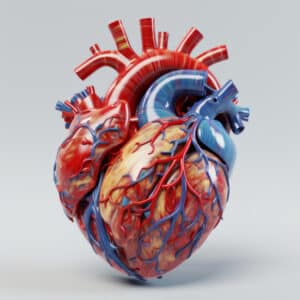Intermittent fasting: Is the popular diet trend harming your heart?
Intermittent fasting, a widely adopted lifestyle trend promoted for its benefits in focus and weight management, faces new scrutiny as a study reveals a significant association with increased cardiovascular mortality
Author
Author
- admin / 4 months

- 0
- 7 min read

Author
When Britain’s former Prime Minister Rishi Sunak casually revealed that he often begins his week with a 36-hour fast, it caught global attention. He wasn’t alone in promoting the practice. Hollywood celebrities, tech leaders, fitness influencers, and politicians across the world have spoken about how intermittent fasting has transformed their lives, often attributing it to sharper focus, weight management, and overall well-being.
Social media posts and glossy magazine features have further fueled the hype, turning intermittent fasting into a lifestyle trend that has moved far beyond a niche diet experiment. The appeal lies in its simplicity: rather than restricting what you eat, the method focuses on when you eat. In a world obsessed with convenience and productivity, it has become an attractive solution. Yet, beneath the celebrity endorsements and glowing testimonials, new research suggests that this trend may carry hidden dangers, especially for the heart.
What is Intermittent fasting, and how does it work?
At its core, intermittent fasting is about alternating between periods of eating and fasting. The most common form, known as the 16:8 method, involves eating all meals within an eight-hour window and abstaining from food for the remaining sixteen hours of the day. For example, one might eat between noon and 8 p.m. and then fast until the next day. Other approaches include the 5:2 diet, in which people eat normally for five days a week but restrict calories on two non-consecutive days, or alternate-day fasting, where individuals cycle between eating days and fasting days.
Proponents argue that this method mimics the eating patterns of early humans, who often went long periods without food. Advocates also cite scientific studies suggesting that fasting allows the body to switch from burning glucose to burning fat for energy, a process believed to boost metabolism, repair cells, and reduce inflammation.

Extending the overnight fast, in particular, has been linked to improved insulin sensitivity, better blood sugar regulation, and even longevity in animal studies. For these reasons, intermittent fasting has been widely celebrated as a lifestyle hack with benefits that go beyond weight loss.
However, a large new study is challenging these trendy claims. Researchers analysed data from over 19,000 adults in the United States and found a striking association between strict intermittent fasting and an increased risk of cardiovascular mortality. Specifically, individuals who confined their eating to an eight-hour window or less were found to have a 135 per cent higher risk of dying from heart-related diseases compared to those who spread their meals over 12 to 14 hours.
Cardiovascular mortality refers to deaths caused by conditions like heart attacks, strokes, and other diseases affecting the heart and blood vessels. The study highlighted that while intermittent fasting did not appear to significantly affect overall mortality rates, the consistent rise in cardiovascular deaths across all age groups, genders, and lifestyle categories could not be ignored. In simpler terms, eating in a very narrow time window may not shorten your life expectancy overall, but it could make you more vulnerable to serious heart problems along the way.
The study drew on data from the National Health and Nutrition Examination Survey (NHANES) collected between 2003 and 2018, tracking 19,831 American adults over a median follow-up period of 8.1 years. Participants were asked to recall everything they ate and drank on two separate days spaced about two weeks apart. Based on these records, researchers calculated each person’s typical eating window. Mortality outcomes were then tracked through the National Death Index until December 2019.
The results showed that people who restricted their meals to less than eight hours a day had markedly higher cardiovascular risks compared to those who ate over 12 to 14 hours. This risk was particularly elevated among smokers, individuals with diabetes, and those already dealing with heart disease. Importantly, the findings remained robust even after adjusting for confounding factors such as diet quality, meal frequency, socioeconomic status, and lifestyle habits. The researchers concluded that while the link between intermittent fasting and overall mortality remains unclear, the increased risk of heart-related deaths is consistent and concerning.
Early criticism
This isn’t the first time intermittent fasting has come under scrutiny. A rigorous three-month study published in JAMA Internal Medicine in 2020 followed 116 adults who were overweight or obese. It found that participants practising time-restricted eating lost an average of just 1.17 per cent of their body weight—a difference not statistically significant compared to the control group, who lost 0.75 per cent. The researchers concluded that fasting did not confer substantial benefits for weight loss or cardiometabolic health in this setting.
Another study indicated that intermittent fasting may produce side effects such as weakness, hunger, dehydration, headaches and difficulty concentrating. have also reported side effects, including weakness, dehydration, headaches, irritability, and difficulty concentrating. For some individuals, especially those with existing health conditions, fasting can do more harm than good.
Expert advice: What are the benefits and risks of intermittent fasting
So where does that leave the fasting trend? On one hand, intermittent fasting offers a structured way to reduce calorie intake without obsessing over specific foods, which some people find liberating. It may help with short-term weight loss and improve markers like blood sugar and cholesterol for certain individuals. On the other hand, the new findings raise the possibility that such benefits come at the cost of long-term heart health.
Dr Rajeshwari Panda, Head of the Dietetics Department at Medicover Hospital, Kharghar, Navi Mumbai, cautions that while the recent findings sound alarming, the science is still evolving. “This is an observational study. So while the headline sounds scary, more research is needed before we can firmly conclude that intermittent fasting directly causes harm,” she explains.
According to her, intermittent fasting does offer some advantages. “It can support weight loss, help regulate blood sugar, improve metabolic markers, and even curb emotional or late-night eating habits,” Dr Panda notes. These benefits, however, are often seen in the short term.
On the other hand, Dr Panda warns that fasting within very narrow windows carries risks. She explains that it can cause fatigue, headaches, weakness, and even muscle loss. Long-term evidence remains mixed, and eating within an extremely short window- such as eight hours- may deprive the body of adequate nutrition while also triggering disordered eating patterns or hormonal imbalances.
She adds that humans have always fasted naturally in the past: “Traditionally, our ancestors often went 10 to 12 hours without food—eating after sunrise and stopping once the sun went down. That pattern gave the body enough time to rest without compromising nutrition. Today’s eight-hour windows are much shorter and may lead to overeating at once, which isn’t beneficial.”
Dr Panda emphasises that fasting is not a “magic” solution. Instead, she insists that long-term health depends on balance. In her words: “For heart health or weight management, you need more than fasting. You must eat a whole-food diet, move your body, sleep well, manage stress, and above all, stay consistent. Anything extreme, whether in diet, exercise, or lifestyle, can harm the body.”
In her practice, Dr Panda stresses moderation, noting that intermittent fasting can be useful as a short-term tool under medical supervision, particularly for patients struggling with emotional eating or unhealthy patterns. However, she cautions against unsupervised long-term fasting, pointing out that if it is done incorrectly, such as combining fasting with junk food or skipping essential nutrients, it can end up harming the organs rather than supporting them.
Her final advice is clear: intermittent fasting can help break unhealthy cycles, but it must be paired with strength training, proper hydration, stress management, and a nutrient-rich diet. She emphasises that balance is key, adding that for most people, a well-rounded diet combined with 10–12 hours of natural fasting is safe and more sustainable. She further explains that this fasting period should ideally be followed while the body is at rest, not during working hours, since the body requires energy to function properly throughout the day.
Also read: FACT CHECK: Can 72 hours of fasting cause the body to eat up tumors?










